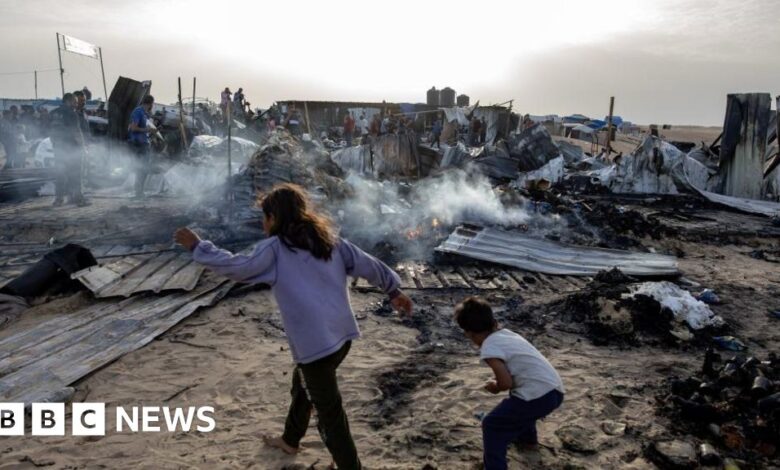Netanyahu vowed to continue the war amid condemnation of the airstrike

Israeli Prime Minister Benjamin Netanyahu vowed to continue the fight against Hamas amid international condemnation of the airstrike that killed dozens of Palestinians in Rafah on Sunday.
According to the Hamas-run Health Ministry, at least 45 people were killed, while hundreds more were being treated for severe burns, broken bones and shrapnel wounds.
Speaking before the Israeli parliament, Mr. Netanyahu said the attack was a “tragic accident” but added: “I have no intention of ending the war before achieving all its goals.”
He said it was important for Israel to take “every possible precaution” to protect civilians and emphasized that the Israel Defense Forces (IDF) were using “its best efforts to do no harm.” people who are not involved” in the conflict.
The speech was interrupted by occasional criticism from family members of hostages taken by Hamas in the October 7 attack, some of whom criticized the prime minister for no agreement was reached for the return of their loved ones.
“In Rafah, we evacuated about one million non-combatant residents and despite our best efforts not to harm non-combatants, unfortunately a tragic incident occurred,” Netanyahu asserted. ”.
“We are investigating the incident and will reach a conclusion as this is our policy.”
International organizations have lined up to condemn the attack, with the EU insisting that Israel respect the International Court of Justice (ICJ) ruling last week to stop attacks on Rafah. The bloc’s top diplomat, Josep Borrell, called Sunday’s attack “appalling.”
Despite the ICJ ruling, Israel remains committed to continuing its invasion of Rafah, while officials insist the ruling leaves room for an attack in compliance with international law.
UN human rights chief Volker Turk said the attack showed “no clear change in the methods and means of warfare used by Israel that have resulted in so many civilian deaths”. “.
Israel launched its Rafah attack on Sunday hours after Hamas’s first rocket attack on Tel Aviv in several months.
IDF officials said the attack on Rafah killed two senior Hamas commanders and that they were investigating the deaths of civilians in the area.
But the Palestinian Red Crescent said the airstrike targeted tents for displaced people near a United Nations facility in Tal al-Sultan, about 2km northwest of central Rafah.
Video from the scene in the Tal al-Sultan area on Sunday evening showed a large explosion and intense fire.
Graphic footage showed several structures on fire next to a banner reading “Kuwait Peace Camp ‘1’,” as well as first responders and bystanders carrying some bodies.
Médecins Sans Frontières (MSF) said on Monday that one of its facilities had received at least 28 dead people, including women and children, after the strike.
They said they treated another 180 injured Palestinians, with most suffering from serious shrapnel wounds, broken bones, concussions and burns.
MSF denied Israeli reports that the attack was accurate, saying “the attack on a densely populated camp in the so-called ‘safe zone’ in Rafah showed a complete disregard for life.” of civilians in Gaza”.
The US called these images “heartbreaking” but affirmed that Israel has the right to self-defense.
A White House national security spokesman said: “Israel has the right to pursue Hamas, and we understand that this attack killed two senior Hamas terrorists who were responsible for the attacks.” attacks against Israeli civilians.”
But they acknowledged that “Israel must take every possible precaution to protect civilians.”
Israeli officials spent much of Monday trying to figure out what happened in Rafah. How did a “precision strike” using specialized weapons with a “reduced number of warheads” lead to a firestorm that killed dozens and injured dozens?
After last week’s ruling by the ICJ, requiring Israel to stop all activities in the Rafah area that could cause further harm to the Palestinian people, Israel knows that the whole world is watching them. It is under enormous pressure to explain its actions.
It said the operation was based on intelligence and that it appeared both Hamas figures were killed.
But the presence of a large number of civilians and what appeared to be a significant amount of flammable material raised many questions about how this incident was planned and carried out.
With top military officials, including IDF advocate Major General Yifat Tomer Yerushalmi, promising a thorough investigation, we can expect some more detailed explanations to emerge soon. presently.
But whether this is a turning point in the campaign is another matter.
Netanyahu remains committed to what he calls “complete victory” in Rafah, so there is no sign that Sunday’s disaster will change his mind.
Despite the horrifying scenes last night, Israeli ground forces appeared to be acting with some caution as they moved closer to the city of Rafah itself.
Their activities have so far not resulted in a bloodbath.
But that is exactly what last night’s airstrikes achieved, dealing another blow to Israel’s already damaged image and undermining its reason to continue pressing forward.
Israel’s military campaign in Gaza began after gunmen from Hamas attacked Israel on October 7, killing about 1,200 people and taking 252 others back to Gaza as hostages.
According to Gaza’s Hamas-run Health Ministry, more than 36,000 Palestinians have been killed in the war since then.


